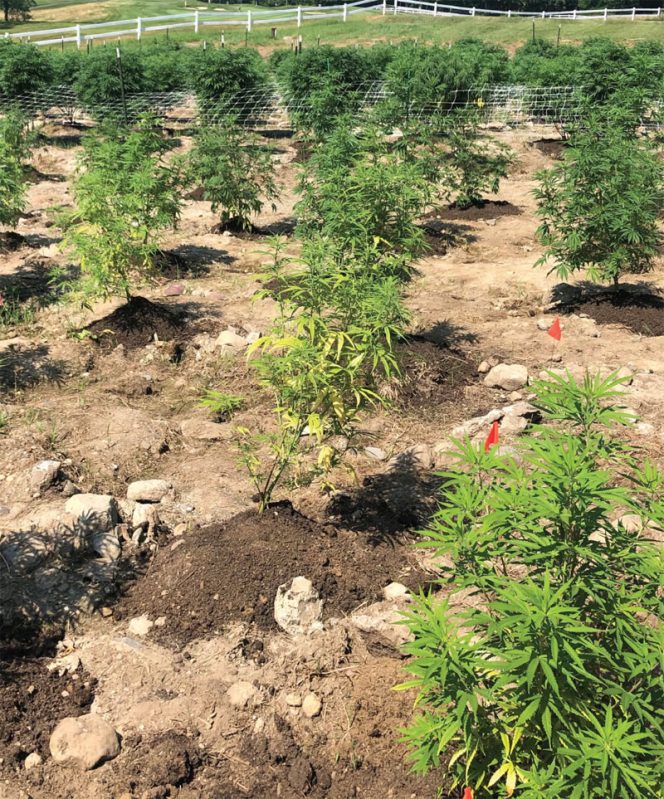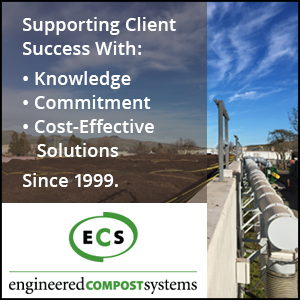BioCycle August 2019
Brattleboro, Vermont: Compost Use On Industrial Hemp Farm

Compost from Windham Solid Waste District’s (Brattleboro, Vermont) is being used on this industrial hemp in Massachusetts.
BioCycle Contributing Editor Robert Spencer is Executive Director of the Windham Solid Waste District in Brattleboro. The District’s composting facility processes source separated organics, including food waste, yard trimmings and food-soiled paper. Compost is sold to a variety of end users — now including an industrial hemp farm in nearby Massachusetts. The company that is growing the industrial hemp for CBD oil production also owns medical and recreational cannabis production facilities. For the outdoor hemp operation, it purchased 20 cubic yards (cy) of three-eighth-inch screened compost as a test load. “This is for a new, relatively small plot, about 3 acres, that is growing cultivated ‘mother clones’ for seed production, and testing the seeds and plants for CBD content and total biomass,” explains Spencer. “The seedlings are grown in a greenhouse in the Connecticut River Valley of Massachusetts, which is also where the farm is located.”
The hemp grower said he has 70 acres of cropland under contract with valley farmers to grow hemp using their seedlings. “Farmers are paid partially on total yield of the crop so have an incentive to manage the crop,” adds Spencer. “As the photos show, compost was put in the hole for seedling roots and for topdressing, as well as ‘power mulch’. The farm didn’t find our compost until after it had planted lots of seedlings.”
What motivated the farmer to buy the compost? “He is a professional grower who has worked in Colorado, California, Washington, and most recently Oregon, and was recruited for Massachusetts,” reports Spencer. “He has used compost in other areas and was looking for it here but did not like the quality of most of it, or it was too expensive, such as certified organic. I had contacted the medical marijuana grower about buying compost, who told me their operation was hydroponic, but said I should talk to the hemp grower. I met him, showed him a sample, and he ordered 20 cy for delivery that week.”
Emmaus, Pennsylvania: Paying It Forward
A 4-H volunteer has been working with young people in her community on a curriculum called “Earth’s Capacity,” which addresses environmental stewardship, sustainability, and related issues. “We used the resources on the BioCycle website for references,” writes Aria Wright in an email to BioCycle. “The kids are becoming quite passionate about protecting our planet! To pay it forward, the kids want to make a suggestion that they believe is a good addition to your page.”
Included in the email was a link to a guide to composting at your apartment. “It’s an awesome guide to apartment composting,” continued Wright. “We thought this was a good suggestion because it explores various composting methods available to apartment dwellers to help lower food waste. If you decide to add it to your resources, I’d love to show the kids that their suggestion was up and running to help others lead a more sustainable lifestyle. It would really help them feel that they contributed positively to a happier and healthier green planet!”
And with this Composting Roundup item, the 4-H’ers’ suggestion is officially now a resource on BioCycle.net.
Greater Brisbane, Australia: Community Composting Hackathon
Yarrabilba in South East Queensland will become Australia’s first “sustainable food city” as part of a Food Agility project led by Queensland University of Technology (QUT) and Lendlease. Food Agility CRC is a $150 million-plus innovation hub that is creating new digital technologies and services to benefit the Australian agrifood industry, according to its website. The Yarrabilba project aims to develop a local food community based on circular economy principles — including collection of food and green waste and converting it into compost, which in turn can be used to support community growing activities and small-scale food enterprises. The first stage of the 3-year project involves development of a prototype community composting system.
QUT and Lendlease invited tech-savvy members of the community to help develop a high-tech prototype for community composting and compost use for local food production. “The event was organized as a ‘Hackathon,’ which brings together coders, developers, designers and innovative minds around a common cause,” explains Johannes Biala, Director of the Centre for Recycling of Organic Waste and Nutrients at the University of Queensland. “Hackathon competitors were asked to come up with an innovative design to build a digitally-enabled community composting system of the future. Around 30 Hackathon and composting enthusiasts followed the call to develop a framework for a high-tech, community-based organics recycling and food production system where in-situ monitoring and data collection facilitates a ‘green credits’ rewards and incentives based local circular economy for organics.”
The event offered peer-to-peer skills exchange and collaboration, roving tech/innovation/business mentors and the opportunity to meet Leanne Kemp, Queensland’s Chief Entrepreneur. Team names included Rawesome Foursome, Rumble Tumble, Green Cycle, Throw’n’ Grow and Wastey Boyz. Outcomes of the Hackathon included a prototype of a sensor-driven rotary home composter, and a sensor-enabled organics collection bin that rejects nonorganic materials. The final winner of the $1,000 prize? Wastey Boyz.
Raleigh, North Carolina: Compost Research Scholarship Awards
Two students were awarded national scholarships from the Composting Council Research & Education Foundation’s (CCREF) Compost Research Scholarship program, and one received a special scholarship for North Carolina college students funded by a donation from the North Carolina Composting Council (NCCC). The CCREF annual scholarship is available to college students to assist with their compost research projects.
The winners of the national scholarships are Anaya Hall, a PhD student in the Energy and Resources Group at University of California Berkeley, and Anne Hallee, an undergraduate at The Evergreen State College in Olympia, Washington with a focus in Chemistry. Hall’s research centers around data-driven models of coupled human and natural systems. Her project will develop a spatial model for the state of California to connect organic waste streams with composting infrastructure and working lands in order to critically evaluate the feasibility and anticipated abatement costs of using composted municipally-generated organic waste as a soil amendment to both sequester carbon and meet state diversion requirements. The research models a range of scenarios to estimate the cost per ton of carbon dioxide equivalent of this abatement strategy and provides the first approximation of the potential impacts of organic waste management for soil carbon in California.
Hallee’s research project will assess the amounts of soluble, plant available P in compost samples from aerated static pile composting facilities when applied to a low fertility soil. She is focusing on composts made from three feedstock groups: manure, green waste and food scraps. Compost characterizations, soil blends and an incubation mimicking a growing year will be studied to evaluate the representative P availability in land applied compost products.
The North Carolina Scholarship winner is Onnr Grogan, a junior in the undergraduate Biological Engineering program at North Carolina Agricultural and Technical State University. The objective of her project is to determine how the method and schedule of turning a compost pile affects the temperature profile, nutrient content, and time required for production of the compost. Wooden open-air pens will be compared to tumbler bins for ease and efficiency. Additionally, the turning schedule will be varied to determine the ideal frequency for compost turning with each method. The long-term goal is to develop the infrastructure and a process necessary to begin a comprehensive composting program through the main dining hall on campus. A cost benefit analysis will be performed to determine the economic sustainability of a continuous composting program compared to the current process of discarding all food in a trash compactor.














